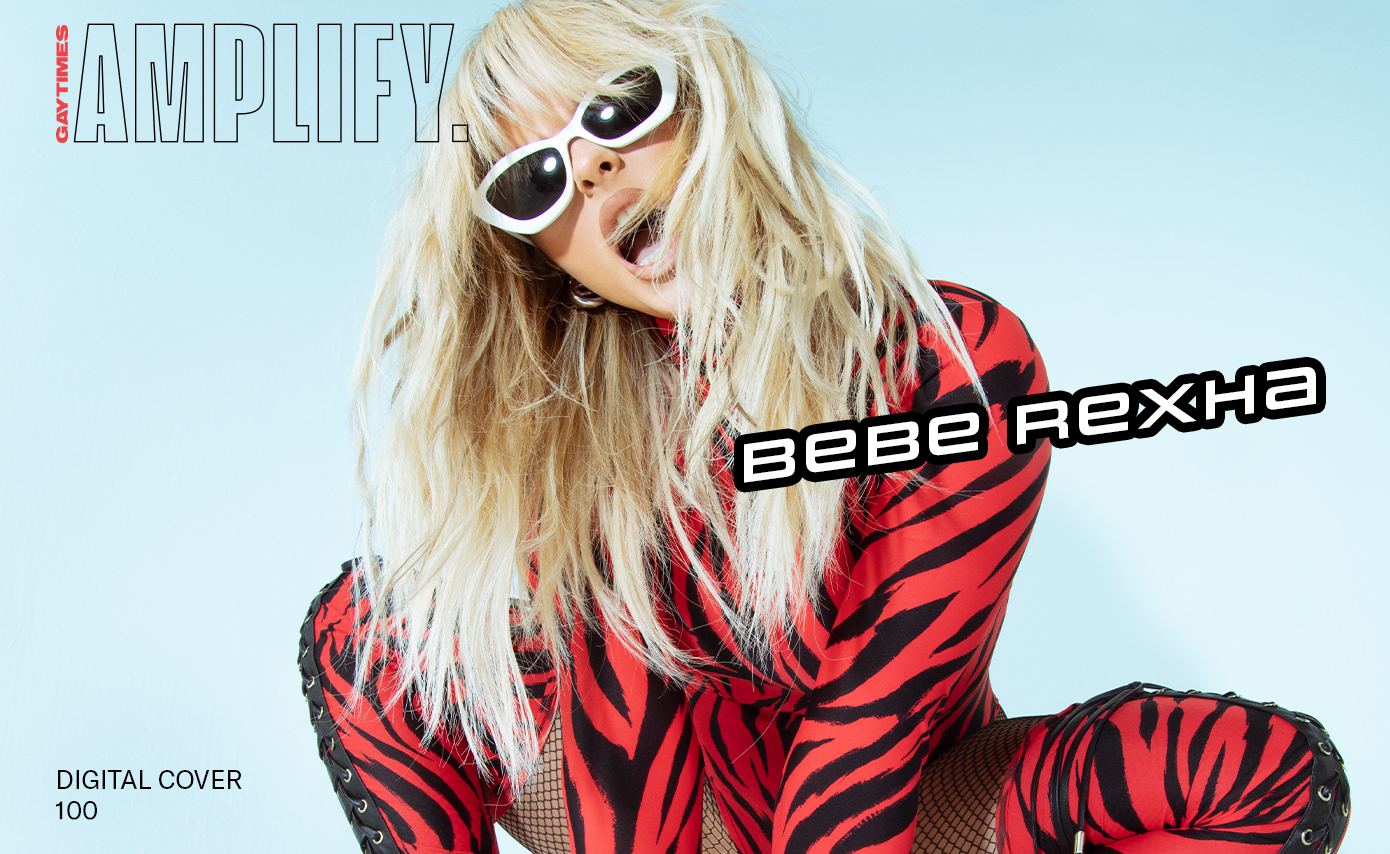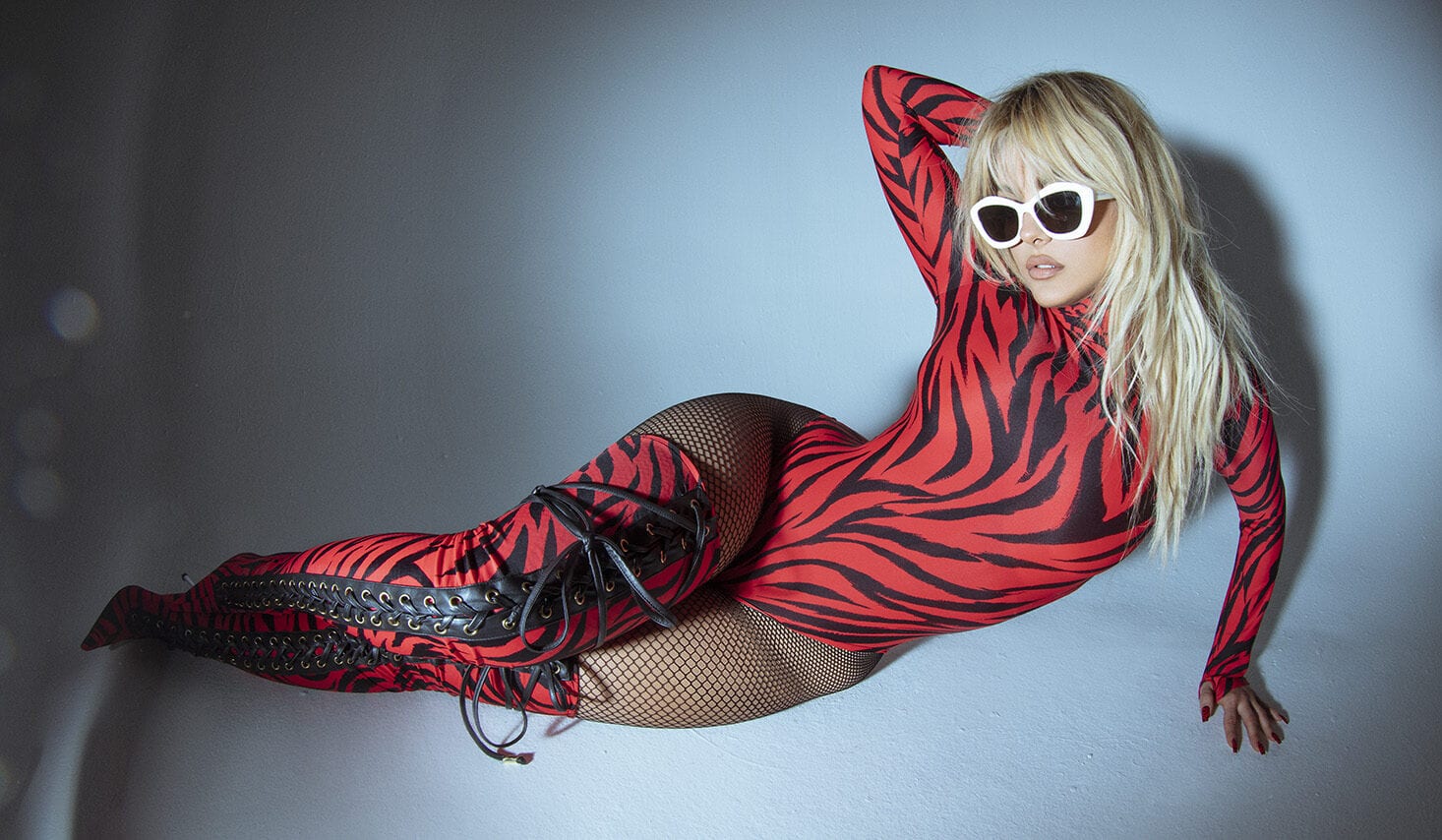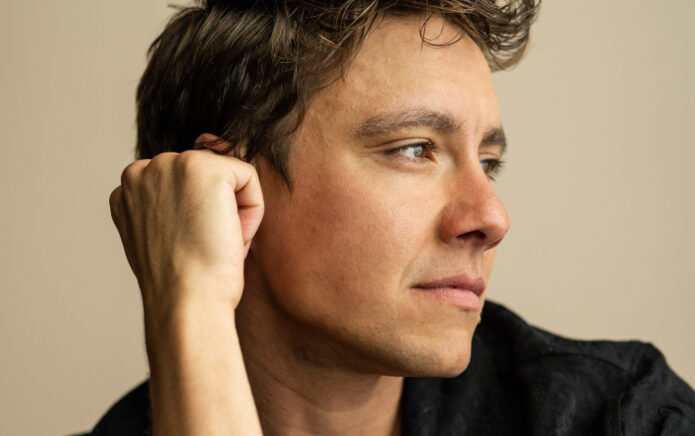
“I’m not going to try to be that perfect pop girl,” Bebe Rexha says with a shrug, “because I just can’t live my life like that.” It’s early morning in LA and the 31-year-old has barely had a chance to start her breakfast, but she’s already telling it like it is. “Growing up, I would look up to all these glossy, beautiful pop stars and I thought that was the way to do it, but it’s not what works for me,” she says. Rexha has realised in the seven years since she dropped her stomping debut solo single I Can’t Stop Drinking About You that her fans prefer it when she’s “honest” and gloss-free.
This honesty runs through her brilliant new album, Better Mistakes, like a stick of rock. On the catchy opening track Break My Heart Myself, Rexha drops a matter-of-fact reference to Klonopin, a prescription drug used to treat anxiety and panic attacks. “My doctor upped my dosage / My mom felt bad, so she sent me roses / Without it, I feel really hopeless,” she sings unselfconsciously. If anything, the guitar-driven ballad Empty, which appears towards the end of the album, is even rawer. “I break down with my daily routine, a fake smile is my accessory,” Rexha sings softly. “I’m tired of feeling low, and I’m too tired to hurt.” It’s affecting stuff.
Rexha is also an open book in person: so much so that even our transatlantic Zoom interview feels pretty intimate. “My fans like it when I talk about my mental health and my weight and not being what the ‘perfect’ pop star looks like,” she continues. “You know, I’m not a [US] size four, I’m an eight-to-ten. Some people are so good at the perfect pop girl thing: they work out every day and eat the perfect things and say the perfect things in interviews.” Rexha says this will never be her. “Like, I will wake up sometimes and have a really shitty day, and when that happens, I’m just gonna be me,” she adds. When several designers declined to dress her for the 2019 Grammy Awards because in their eyes she was “too big”, Rexha publically called them out. “That’s crazy. You’re saying that all the women size 8 and up are not beautiful and can’t wear your dresses?” she tweeted.
As well as being honest to a fault, the album is catchy as hell: another Bebe Rexha signature. Before she launched her solo career in 2014, the Brooklyn-born artist had already made a splash as a songwriter who can turn edgy subject matter into pop gold. A year earlier, Eminem and Rihanna recorded The Monster, a song Rexha wrote while in “a dark head space”, and turned it into a number one hit. Rexha has said this “opened doors” for her but it sounds as though the whole experience was somewhat bittersweet. “At that time I had no choice but to give that song away,” she revealed in a 2017 Facebook Live. “I had no money and no record deal.”
Thankfully, Rexha has since racked up hits of her own, mainly as an in-demand collaborator. Among her steady stream of gold and platinum singles are the electro thumper In the Name of Love with Dutch DJ Martin Garrix, hip-hop bop Me Myself & I with rapper G-Eazy, and club banger Hey Mama with David Guetta, Nicki Minaj and Afrojack. Because she’s worked with so many different artists, hopping from genre to genre along the way, Rexha has often felt like a tricky artist to pin down. At times, her career arc has looked a little random: in 2017, she scored her biggest hit to date when she took an unexpected excursion into country-pop with Nashville duo Florida Georgia Line. Their ingratiating, laid-back love song Meant to Be has now amassed more than a billion Spotify streams.

Today, Rexha says Meant to Be’s enormous success caught everyone off guard. “I didn’t ask for that, I swear to God!” she hoots. “I wrote the song with the [Florida Georgia Line] guys for their album, but they didn’t wanna put it on their album because they didn’t believe in it.” So, recognising that the song had potential, Rexha decided to include it on her latest EP instead. “And then it fucking blows up!” she says with a laugh. “What am I gonna do, not put out a song that sounds like a hit? Do you know how many [potential] hit songs I probably have sitting on my computer because somebody didn’t believe in it?” Rexha says that before she recorded Me, Myself & I as a hip-hop track with G-Eazy, she had already made a “dancehall version” that she thought would blow up in the UK. However, at the time no one else seemed quite so excited about it. “So I had no choice,” she continues. “Well, not ‘no choice’, but I played it to G-Eazy without that [dancehall] beat because it would’ve thrown him off.” She says this kind of thing happens a lot. “It’s not always that people don’t believe in a song,” she says, “it’s that they’re not moving on it.”
No one could accuse Rexha of failing to move on her own career. Raised in Brooklyn and then Staten Island by her Albanian parents – her father emigrated to New York when he was 21; her mother was born in the US to an Albanian family – she displayed talent and pluck from a young age. As a kid, she taught herself to play the trumpet, guitar and piano, sang in school musicals and the choir, and began composing her own material. By the age of 15, she had been discovered by a talent scout and found herself in songwriting sessions with men three times her age. “They would kind of laugh at me,” Rexha recalled a few years ago. “I sucked at the time, but I was really driven.” This steeliness has stood her in good stead ever since. Initially she wasn’t credited as a featured artist on Hey Mama despite singing its chorus because the song already had two other featured artists on it: Nicki Minaj and Afrojack. After it blew up in 2015, Rexha kept fighting her corner and got her name added, too.
Released in 2018 after a trio of EPs, Rexha’s debut album Expectations did well, spawning the infectious take-me-as-I-am bop I’m a Mess. But Better Mistakes definitely feels like a step up: it’s more cohesive and better captures her tough, spunky personality. This shines through even on lighter moments like the hard-slapping single Sacrifice, which Rexha announced in February by tweeting: “I’m gonna give the gays everything they want on this one song.” Today, she says Sacrifice was partly inspired by her best friend, stylist Wilford Lenov, who is gay. “He’s like, ‘You always do dance songs with other people – they’re always collaborations. I need you to give me that gay anthem that I want and I need,'” she recalls. “So when I recorded Sacrifice, I was like, ‘I’m obsessed’, but I played it to Wilford first to get the OK. And he loved it.” After the song dropped, her LGBTQ fans were just as obsessed. “I got a lot of good vibes,” Rexha says. “Basically people were like, ‘Okay. You were not lying when you said that!'”
It’s hardly surprising that Rexha understood the assignment when she decided to “give the gays everything they want”; after all, she’s a member of the LGBTQ community herself. When she was asked in an interview last year why she hadn’t “defined” her sexuality, she replied: “I try to keep one thing personal to me. But I consider myself fluid. Until I find ‘the one,’ I can’t just say what I am. I just want to find someone I love and who loves me – and I don’t care if that’s a boy or a girl.”
What I believe about sexuality is this: it's a scale. Have I gone out with girls before? Yes. Have I dated girls? Yes, I have. And famous ones, but I'm not naming them. Even though people would be living for it – no!
Today, she is more than happy to expand on her fluidity – in fact, she answers questions that I don’t even ask. “What I believe about sexuality is this: it’s a scale,” she says. “Have I gone out with girls before? Yes. Have I dated girls? Yes, I have. And famous ones, but I’m not naming them. Even though people would be living for it – no!” We both laugh. “Have I fallen in love with a girl before? Yes,” she continues. “But right now, I’m in a relationship with a guy.”
Rexha says that for her, attraction is simply based on “whoever inspires me” at a particular time. “The only thing I will say,” she adds, “is that when I’m in a relationship with a girl, it’s just too emotional. The power… I personally cannot deal with that.” She says she fully understands why some people prefer to label themselves “gay”, “bi” or “straight”; but for her, understanding who she is drawn to romantically has been more of a journey. “It’s just so hard because everybody wants to put people in boxes and I don’t like boxes, as you can tell with my music,” she says. “Like, I don’t like boxes whatsoever.”
Rexha says she saw her music being embraced by LGBTQ fans even before she launched her solo career: the “emo gays” got her from the start. Before she signed her solo deal in 2013, Rexha spent two years as a member of Black Cards, Pete Wentz’s post-Fall Out Boy project, and cut her teeth on the punky Warped Tour. “I would sometimes spend three hours after the show at the merch table – even if people didn’t buy anything, I’d be talking to them and hugging them,” she recalls. “This was a long time before Covid, of course! But I can’t tell you how many people told me that they came out to their parents and got kicked out and saved up all their money to come to that tour.”
These coming out stories clearly had a lasting effect on Rexha. “I’ve had friends who had a relatively easy coming out – my best friend, he doesn’t give a fuck, everybody knew from the top [that he was gay] and didn’t even ask him,” she says. “But I’ve also had friends who tried to tell their parents and they didn’t really get it, and I can’t imagine what that is like.” She says her music’s ability to comfort queer fans came as a surprise. “Like, I didn’t realise my music could do that, that it actually could give people strength,” she says.
Rexha has given other fans strength by being open about her mental health journey. In April 2019, she revealed on Twitter that she has bipolar disorder. Today, she says it took “a minute” to figure out how to manage her condition, but believes she’s in a good place now. “I don’t wanna get into [specific] pills because I feel like that’s too personal,” she says. “But finally, I was able to get on some meds that really help me.” When I ask whether it felt good to go public about it in 2019, she resists giving a bland, pat answer. “Um… kind of,” Rexha says after a pause. “Because I feel like there’s still a lot of stigma behind it. I didn’t know if people were still gonna want to be my friend.” She says that in the past, she had a friend with a mental health condition and wasn’t as supportive as she could have been. “I kind of judged him a little bit, and I feel guilty about that now,” she admits. “It’s funny how the world works. But because of that, I was scared that people might judge me for it.”
She says she ultimately decided to share her diagnosis partly because it was freeing, and partly because she had drawn strength from learning that fellow singers Demi Lovato and Mariah Carey also have bipolar disorder. “Mariah is a fucking beast – she has written all of her own songs,” she says. “To be able to do that, and be so successful even though you have your issues or whatever, that is so inspiring.”
After spending some time with Rexha, it’s hard not to reach the conclusion that her candour, work ethic and commitment to being authentically herself is also pretty inspiring. Fittingly enough, when I ask what she wants people to think when they hear her name, she gives a one-word answer: “Unapologetic.”
Bebe Rexha’s new album Better Mistakes is available to stream and download from 7 May.
